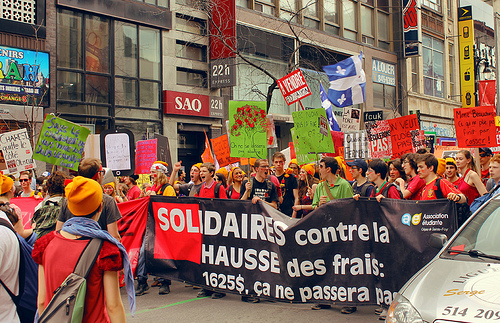The Quebec student strike may be over, but it continues to cast a long shadow on Canadian students. Faced with much higher tuition fees and a similar neoliberal curves, many have resolved to seek inspiration from the mechanisms that made the maple spring a success.
Yet in recent months, after the initial honeymoon, some may have hit structural walls. As the CFS-FCÉÉ AGM begins in Gatineau, strong qualifiers — “racist,” amongst others — have allegedly been used to describe Quebec student associations, specifically targeting CLASSE’s culture of general assemblies.
Is this strong claim legitimate, or is it being used to justify inertia?
Accusing Quebec of racism is commonplace, even politically fashionable. Language laws, successive referendums and the recent immigration debate have framed Québécois as intolerant. Trudeau multiculturalism, by contrast, garners consensus, negating Quebec’s — and other people’s — right to exist outside of a sweeping rhetoric of national unity. All standard so far.
Yet increasingly, those who jump to accusations of racism are themselves guilty of exclusion. In the debate which concerns us — the student strike — they adhere to a certain vision of Quebec, that of a distinct society, both culturally militant and racist. When these two stereotypes are considered as a whole, one can easily mistakenly imagine rows of rowdy Montrealers loudly protesting a rise in alcohol prices while chanting anti-synagogue slogans. Might as well.
I have been to dozens of general assemblies. No, our student associations generally don’t benefit from reserved constituency seats. Queer theory has yet to gain acceptance within those who fill executives, and our syndicalist structures are reminiscent of the 1970s, far away from the currents of the post-Left.
Yet we hold regular general assemblies, regrouping one, two, ten, fifty per cent of the entire membership of the association outside of periods of mobilization. The few (and effective) structural mechanisms favoring participation of women only seek to reinforce this core, self-governed collective decision-making body. Which is more inclusive? 300 000 students know the answer by heart.
Challenging racism within and outside is not our movement’s forte: I have no trouble admitting that we have a lot to learn. However, to discount general assemblies or, more generally, structural change on that basis is not only mistaken: it is a political smokescreen used to draw attention away from awkward, yet necessary debates about direct democracy. Because the Quebec example is not one of racism.
Jérémie Bédard-Wien is a Montreal student.
Photo: Tina Mailhot-Roberge



